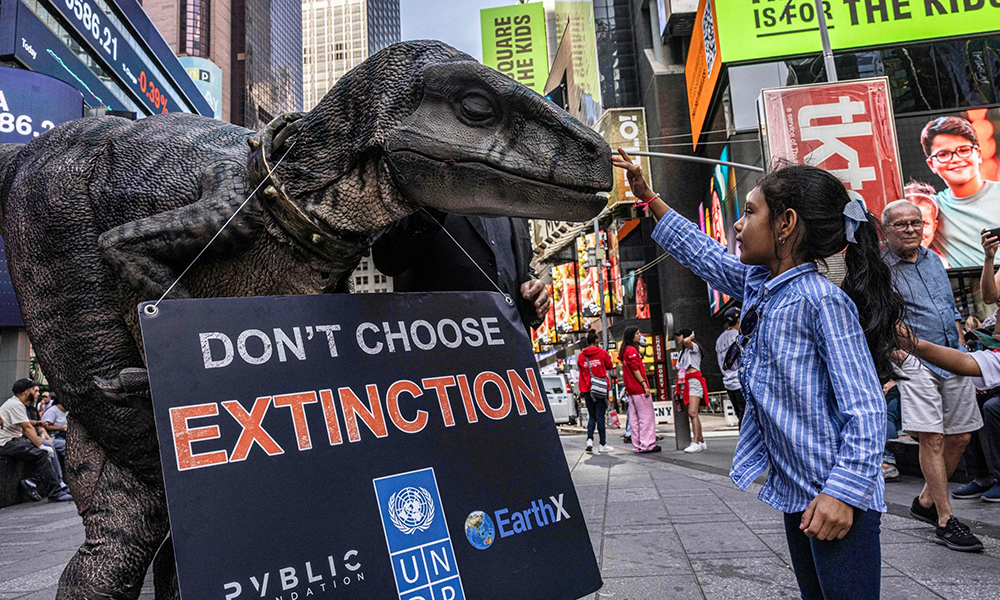
长期以来,世界各国一直在谈论加快气候行动。随着联合国大会(UN General Assembly)和纽约气候周(New York Climate Week)正在如火如荼地进行,“加速”一词在许多会议的议程上仍然很突出。那么,正如联合国秘书长安东尼奥·古特雷斯在两周前所说,为什么气候行动停滞不前?需要做什么才能够让世界各国采取行动?
确实,能源转型正在面临强大的阻力。近期,新冠疫情和俄乌冲突对全球市场和经济产生了前所未有的影响。随着国家财政受到影响,经济冲击会影响每个人,一些人对加快能源转型的必要性提出了质疑。
在这些新的质疑之外,事实是世界各国在脱碳方面的进展非常缓慢,远未达到必须实现的水平。世界上80%的能源消耗仍然来自化石燃料,而20%来自电力。甚至,60%的电力来自煤炭、天然气和石油发电。国际能源署(IEA)预测,在2021年至2026年期间,全球可再生能源将比前五年增加60%。但国际能源署也指出,这一趋势无法到2050年实现净零排放(Net Zero)。
全球向清洁能源的转变正在以慢跑的速度进行,而不是以所需要的冲刺速度进行,这一事实应该给我们所有人敲响警钟。
然而,有真正明亮的灯塔出现。到目前为止,可再生能源给环境带来的积极影响包括能源自给自足、改善贸易平衡和增加工业发展机会,这些积极影响毫无疑问让清洁电力的其他优势黯然失色。最后同样重要的是,改用可再生能源可以降低能源成本,提高竞争力。这些优势终于开始得到应有的关注。
在当前地缘政治发展的推动下,能源转型难题的重要部分已经出现,而其他一些部分正在汇集起来。在过去的两个月里,许多排放大国——美国、欧盟(EU)和澳大利亚已经提高了清洁能源推广目标。私营企业也在以创纪录的水平加大投资,以大幅扩大清洁能源项目的交付——投资者对提供绿色融资越来越感兴趣。Iberdrola在可再生能源和电力网络方面已经是世界领先企业,目前运营规模达4万兆瓦,其目标是在短短十年内将其可再生能源产能增加一倍以上。
然而,重大障碍依然存在。地方、国家和国际的政策和法规往往不一致。例如,一个只需12个月就能够完成的大型清洁能源项目,却仍然需要五年以上的时间才可以从多个政府部门获得许可。行政流程不应该比交付急需的兆瓦级绿色电力或强化可实现电力分配的电网多花五倍的时间。此外,欧盟(European Union)里的一些国家的干预主义阻碍了投资,减缓了可再生能源的增长和能源转型本身。
可以迅速做出一些显著的改进,以完善世界上大多数国家的经济、政策和监管框架,从而能够加速可再生能源投资。哥伦比亚大学(Columbia University)正在撰写一份新报告,旨在让政策制定者对如何克服障碍有更清晰的认识,从而能够扩大可再生能源、强化网络,并改善其存储基础设施。
尽管自2015年巴黎气候大会以来,许多国家发表的声明都野心勃勃,但世界上仍然有许多国家犯了政策错误,或者其勇气和紧迫感已经消退,这对那些不愿意改变任何事情的人来说是好消息。但是,犯错本身就是学习机会——而这份报告旨在明确这些学习机会在哪里。
上周在纽约出席活动的政策制定者应该承认,当前的逆风实际上是能源转型必须加快步伐的最后警告信号。化石燃料市场的混乱会给整个世界蒙上一层乌云。是时候通过扩大可再生能源、强化网络和改善存储来加速推进电气化了。这是解决目前许多问题的应有之义,不仅是在脱碳方面,而且是在可负担性、能源自主和供应安全等领域。
事实表明,对化石燃料的过度依赖是造成气候危机的原因,是造成当前和以往能源紧急情况的原因,也是造成几个时期经济动荡的主要原因。我们面前有一个可靠的替代方案,可以缓解气候危机,保障能源安全,并带来广泛的经济效益。我们必须克服阻碍,改正错误,从而加速推动可再生能源发展。
通过可再生能源推进电气化是各国迅速获得安全、清洁和廉价能源的唯一途径。(财富中文网)
伊格纳西奥·加兰(Ignacio Galán)是Iberdrola公司的董事长兼首席执行官。
Fortune.com上的评论文章仅代表作者个人观点,不代表《财富》杂志的观点和立场。
译者:中慧言-王芳
长期以来,世界各国一直在谈论加快气候行动。随着联合国大会(UN General Assembly)和纽约气候周(New York Climate Week)正在如火如荼地进行,“加速”一词在许多会议的议程上仍然很突出。那么,正如联合国秘书长安东尼奥·古特雷斯在两周前所说,为什么气候行动停滞不前?需要做什么才能够让世界各国采取行动?
确实,能源转型正在面临强大的阻力。近期,新冠疫情和俄乌冲突对全球市场和经济产生了前所未有的影响。随着国家财政受到影响,经济冲击会影响每个人,一些人对加快能源转型的必要性提出了质疑。
在这些新的质疑之外,事实是世界各国在脱碳方面的进展非常缓慢,远未达到必须实现的水平。世界上80%的能源消耗仍然来自化石燃料,而20%来自电力。甚至,60%的电力来自煤炭、天然气和石油发电。国际能源署(IEA)预测,在2021年至2026年期间,全球可再生能源将比前五年增加60%。但国际能源署也指出,这一趋势无法到2050年实现净零排放(Net Zero)。
全球向清洁能源的转变正在以慢跑的速度进行,而不是以所需要的冲刺速度进行,这一事实应该给我们所有人敲响警钟。
然而,有真正明亮的灯塔出现。到目前为止,可再生能源给环境带来的积极影响包括能源自给自足、改善贸易平衡和增加工业发展机会,这些积极影响毫无疑问让清洁电力的其他优势黯然失色。最后同样重要的是,改用可再生能源可以降低能源成本,提高竞争力。这些优势终于开始得到应有的关注。
在当前地缘政治发展的推动下,能源转型难题的重要部分已经出现,而其他一些部分正在汇集起来。在过去的两个月里,许多排放大国——美国、欧盟(EU)和澳大利亚已经提高了清洁能源推广目标。私营企业也在以创纪录的水平加大投资,以大幅扩大清洁能源项目的交付——投资者对提供绿色融资越来越感兴趣。Iberdrola在可再生能源和电力网络方面已经是世界领先企业,目前运营规模达4万兆瓦,其目标是在短短十年内将其可再生能源产能增加一倍以上。
然而,重大障碍依然存在。地方、国家和国际的政策和法规往往不一致。例如,一个只需12个月就能够完成的大型清洁能源项目,却仍然需要五年以上的时间才可以从多个政府部门获得许可。行政流程不应该比交付急需的兆瓦级绿色电力或强化可实现电力分配的电网多花五倍的时间。此外,欧盟(European Union)里的一些国家的干预主义阻碍了投资,减缓了可再生能源的增长和能源转型本身。
可以迅速做出一些显著的改进,以完善世界上大多数国家的经济、政策和监管框架,从而能够加速可再生能源投资。哥伦比亚大学(Columbia University)正在撰写一份新报告,旨在让政策制定者对如何克服障碍有更清晰的认识,从而能够扩大可再生能源、强化网络,并改善其存储基础设施。
尽管自2015年巴黎气候大会以来,许多国家发表的声明都野心勃勃,但世界上仍然有许多国家犯了政策错误,或者其勇气和紧迫感已经消退,这对那些不愿意改变任何事情的人来说是好消息。但是,犯错本身就是学习机会——而这份报告旨在明确这些学习机会在哪里。
上周在纽约出席活动的政策制定者应该承认,当前的逆风实际上是能源转型必须加快步伐的最后警告信号。化石燃料市场的混乱会给整个世界蒙上一层乌云。是时候通过扩大可再生能源、强化网络和改善存储来加速推进电气化了。这是解决目前许多问题的应有之义,不仅是在脱碳方面,而且是在可负担性、能源自主和供应安全等领域。
事实表明,对化石燃料的过度依赖是造成气候危机的原因,是造成当前和以往能源紧急情况的原因,也是造成几个时期经济动荡的主要原因。我们面前有一个可靠的替代方案,可以缓解气候危机,保障能源安全,并带来广泛的经济效益。我们必须克服阻碍,改正错误,从而加速推动可再生能源发展。
通过可再生能源推进电气化是各国迅速获得安全、清洁和廉价能源的唯一途径。(财富中文网)
伊格纳西奥·加兰(Ignacio Galán)是Iberdrola公司的董事长兼首席执行官。
Fortune.com上的评论文章仅代表作者个人观点,不代表《财富》杂志的观点和立场。
译者:中慧言-王芳
The world has been talking about accelerating climate action for a very long time. With the UN General Assembly and New York Climate Week in full swing, the word “acceleration” remains prominent on the agendas in many of the meetings. So why, as UN Secretary-General António Guterres stated at two weeks ago, is climate action flatlining? And what needs to be done to jolt the world into action?
It is true that the energy transition is facing powerful headwinds. COVID, and the invasion of Ukraine by Russia, have impacted global markets and economies like nothing else in recent times. With national finances impacted, and economic shocks affecting everyone in society, some have raised doubts about the need to speed up the energy transition.
These new doubts come on top of the fact that the world’s progress toward decarbonization was already slower than necessary. 80% of the world’s energy consumption is still covered by fossil fuels, versus 20% by electricity. And even, 60% of this electricity is produced with coal, natural gas, and oil. The IEA forecasts that between 2021 and 2026 the world will see 60% more renewables come online than we did than in the previous five years. But the IEA also points out that this trend is not on track to meet its own Net Zero by 2050 Scenario.
The fact that the global switch to clean energy is moving at a jogging pace rather than the required sprint should alarm us all.
There are, however, real beacons of light. Until now, the unquestionably positive environmental impacts of renewable energies have overshadowed the other benefits of clean electricity: energy self-sufficiency, improvements in trade balance, and opportunities for industrial development. Last, but not least, switching to renewable electricity reduces energy costs, improving competitiveness. These benefits are finally beginning to get the attention they deserve.
Significant pieces of the energy transition puzzle are already in place, and some others are coming together, driven by current geopolitical developments. Within the last two months, many big emitters–the U.S., EU, and Australia have upgraded ambitions on clean energy rollouts. Private companies are also investing at record levels to drastically scale up the delivery of clean energy projects – and there is increasing interest from investors to provide green finance. Iberdrola, already a world leader in renewable energy and power networks with 40,000 MW in operation, aims to more than double its renewable energy capacity in just a decade.
Substantial barriers do remain. Local, national, and international policies and regulations are all too often not aligned. For example, it can still take more than five years to gain permits from a wide range of authorities for a large clean energy project that can be built in just 12 months. Administrative processes should not take five times longer than the process of delivering urgently needed green megawatts or reinforcing the grid to distribute them. Also, the interventionism of some countries of the European Union discourages investments, slowing down the growth of renewables and the energy transition itself.
There are some obvious improvements that can be made quickly to strengthen economic, policy, and regulatory frameworks in most countries across the world to accelerate renewable energy investments. Columbia University is working on a new report that aims to give policymakers a sharper view on how to overcome obstacles to scaling renewables and network and storage infrastructures.
For all the ambitious statements since Paris in 2015, there are many countries around the world where policy mistakes have been made, or where courage and a sense of urgency have faded away, to the benefit of those who would like nothing to change. But mistakes are learning opportunities–and the report aims to make clear where those opportunities lie.
Policymakers In New York last week should acknowledge that the current headwinds are, in fact, the final warning sign needed to show that the energy transition must move much faster. Disruption in fossil fuel markets can cast a dark cloud over the whole world. It’s time to double down on electrification through renewables, networks, and storage. This is the answer to many of the current issues not only in decarbonization, but also in the areas of affordability, energy autonomy, and security of supply.
The facts show that overdependence on fossil fuels is the cause of the climate crisis, responsible for the current and previous energy emergencies, and largely to blame for several periods of economic turmoil. We have a credible alternative ahead of us that may alleviate the climate crisis, improve energy security, and deliver widespread economic benefits. We must overcome the obstacles and mistakes that are undermining the acceleration of renewables.
Electrification through renewable energies is the only way for countries to quickly have secure, safe, clean, and cheap energy.
Ignacio Galán is the chairman and CEO of Iberdrola.
The opinions expressed in Fortune.com commentary pieces are solely the views of their authors and do not reflect the opinions and beliefs of Fortune.






